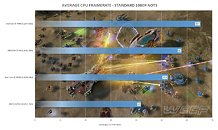- Joined
- Oct 9, 2007
- Messages
- 47,511 (7.49/day)
- Location
- Hyderabad, India
| System Name | RBMK-1000 |
|---|---|
| Processor | AMD Ryzen 7 5700G |
| Motherboard | ASUS ROG Strix B450-E Gaming |
| Cooling | DeepCool Gammax L240 V2 |
| Memory | 2x 8GB G.Skill Sniper X |
| Video Card(s) | Palit GeForce RTX 2080 SUPER GameRock |
| Storage | Western Digital Black NVMe 512GB |
| Display(s) | BenQ 1440p 60 Hz 27-inch |
| Case | Corsair Carbide 100R |
| Audio Device(s) | ASUS SupremeFX S1220A |
| Power Supply | Cooler Master MWE Gold 650W |
| Mouse | ASUS ROG Strix Impact |
| Keyboard | Gamdias Hermes E2 |
| Software | Windows 11 Pro |
According to performance numbers of an AMD "Summit Ridge" ZEN CPU engineering-sample put out by WCCFTech, AMD's claims of IPC gains are gaining credibility, and showing signs of the gaming PC processor market warming up again. An engineering sample featuring 8 cores and 16 threads (via SMT), beat Intel's Core i5-4670K processor. This sample featured clock speeds of 2.80 GHz, with 3.20 GHz boost.
The "Summit Ridge" sample provided 10 percent higher frame-rates than a Core i5-4670K, in the "Ashes of the Singularity" 1080p benchmark. The chip is still convincingly beaten by 12 percent, by a Core i7-4790 (non-K), running at 3.60 GHz, with 4.00 GHz boost. This shows that AMD could leverage the new 14 nm FinFET process to crank up clock-speeds, and produce SKUs competitive with current Intel "Skylake-D" Core i5 and Core i7 processors.

View at TechPowerUp Main Site
The "Summit Ridge" sample provided 10 percent higher frame-rates than a Core i5-4670K, in the "Ashes of the Singularity" 1080p benchmark. The chip is still convincingly beaten by 12 percent, by a Core i7-4790 (non-K), running at 3.60 GHz, with 4.00 GHz boost. This shows that AMD could leverage the new 14 nm FinFET process to crank up clock-speeds, and produce SKUs competitive with current Intel "Skylake-D" Core i5 and Core i7 processors.

View at TechPowerUp Main Site







